The pandemic gave us all time to pause, reset, and think about the future of our careers. You may be contemplating a new job in your field or a career transition to a new industry. If you’re not sure what the best move for you is right now, this resource is for you. With inputs from over 20 leading recruiters and career coaches in tech, we’ll dive into:
The hiring market in tech right now and what employees are looking for
4 questions to ask yourself if you’re deciding how to quit or if you should stay
Tangible advice on aligning your values with your next career move
Purpose exercises to help you explore your future career planning
👀 Already know you're ready for something new? Join the Elpha Talent Pool to be matched directly with 500+ roles at tech's leading workplaces where your skills and values align.
The Great Resignation: What tech employees want
Post-pandemic, the tech industry has largely rebounded and a new trend has emerged: ‘The Great Resignation.’ A record 4 million people quit their jobs in April and 26% of workers are planning to look for something new.
What are the motivating factors behind this shift?
Hiring is way up across the industry.
As Nancy Yee , Recruiter at Render puts it, “I think the market has officially graduated from "reheating" to red hot.”
Jennifer Kim , Head of People and D&I Strategist for Startups, shares her thoughts on this momentum.
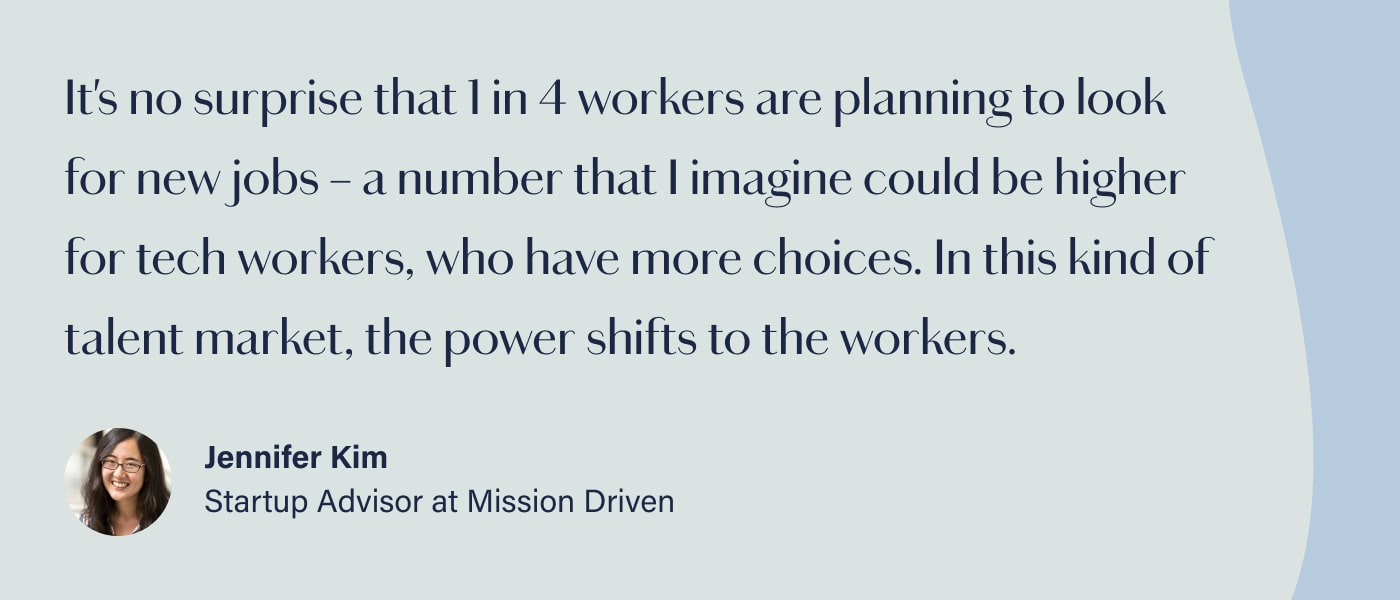
"It's no surprise that 1 in 4 workers are planning to look for new jobs – a number that I imagine could be higher for tech workers, who have more choices. In this kind of talent market, the power shifts to the workers."
The alignment between company and personal values - from D&I efforts to work/life balance - has taken center stage.
Diversity, equity, and inclusion efforts have become critically important to many candidates and hiring managers. As Sasha Martin , Head of Recruiting at Shelf Engine , shares:
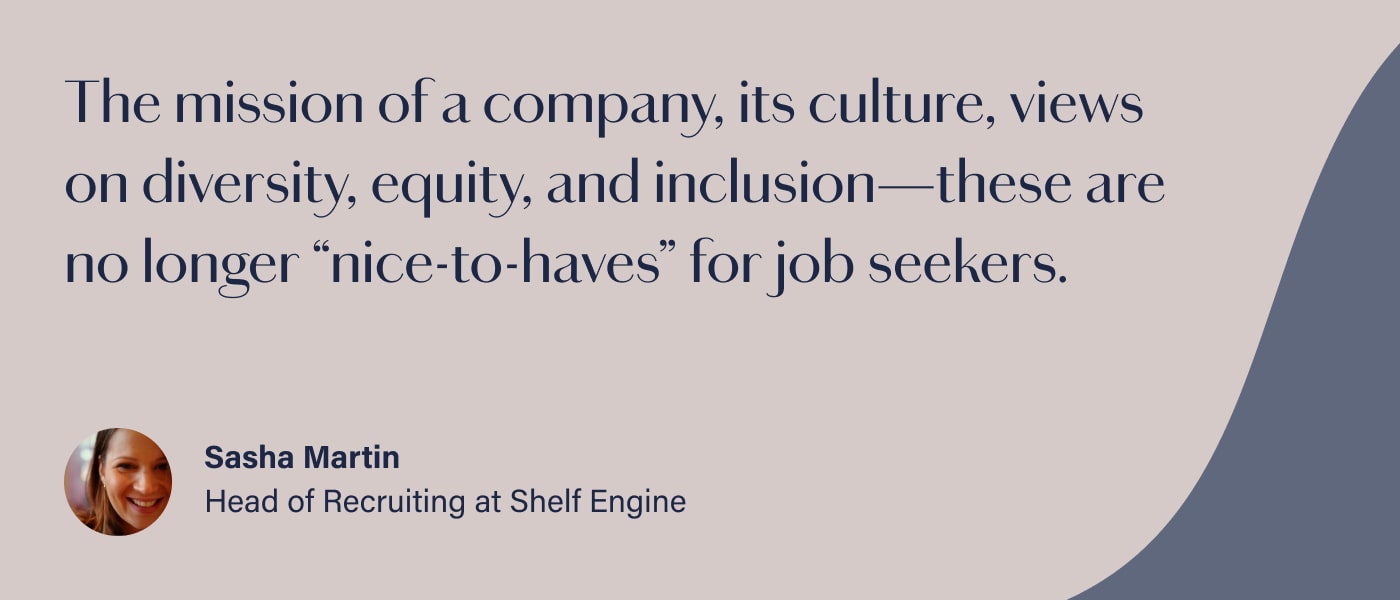
"Ongoing social justice and political events have prompted people to examine their values and philosophies and get clearer on what really matters to them. The mission of a company, its culture, views on diversity, equity, and inclusion—these are no longer “nice-to-haves” for job seekers. Candidates are asking direct questions about these facets and are making decisions based on how strong the alignment is between the organization and themselves."
As Jennifer Kim puts it, "The pandemic disrupted pretty much all aspects of life, and how organizations operate and staff up was no exception. The biggest trends have been not just about crisis response, but how companies and workers have responded to each other. This, combined with many other factors—challenges of quickly adjusting to remote work, the wide range of corporate responses to #BlackLivesMatter protests—left a strong impression on tech workers, whose expectations for their companies are higher than ever."
Recruiters are also seeing candidates raise more questions and concerns around work/life balance. Nancy Yee has noticed this at Render:
"While work/life balance is a very real concern for all of us, especially when considering an earlier, smaller startup, this wouldn't regularly surface as a candidate concern… Today, I'm noticing more and more candidates openly raising their questions around work/life balance (specifically, how employers make this a reality and what practices are in place to support employees) without needing to justify why this is important to them."
The crisis response to the pandemic, social justice and political events, and the move to remote work have likely changed the hiring and recruiting process forever.
Questions to start with: should you stay or go?
The market is hot and there are lots of opportunities out there. It’s natural to feel overwhelmed with what to do next. But before you decide what to do next, first you have to decide whether moving on to something new is the right move for you.
If you’re not sure if you should stay in your current job or look for something new right now, here are the four steps that career coaches suggest you take:
Get clear about how you’re feeling
Review key indicators that it’s time to move on
Assess how much you’re growing & learning
Consider talking to your manager
1. Where are you now, exactly? Get clear on this.
If you’re thinking about a career move, the first step in your thinking should be to get clarity about how you feel about your current company and job. Start by asking yourself questions like: What isn’t working in your current situation? What do you want more of?
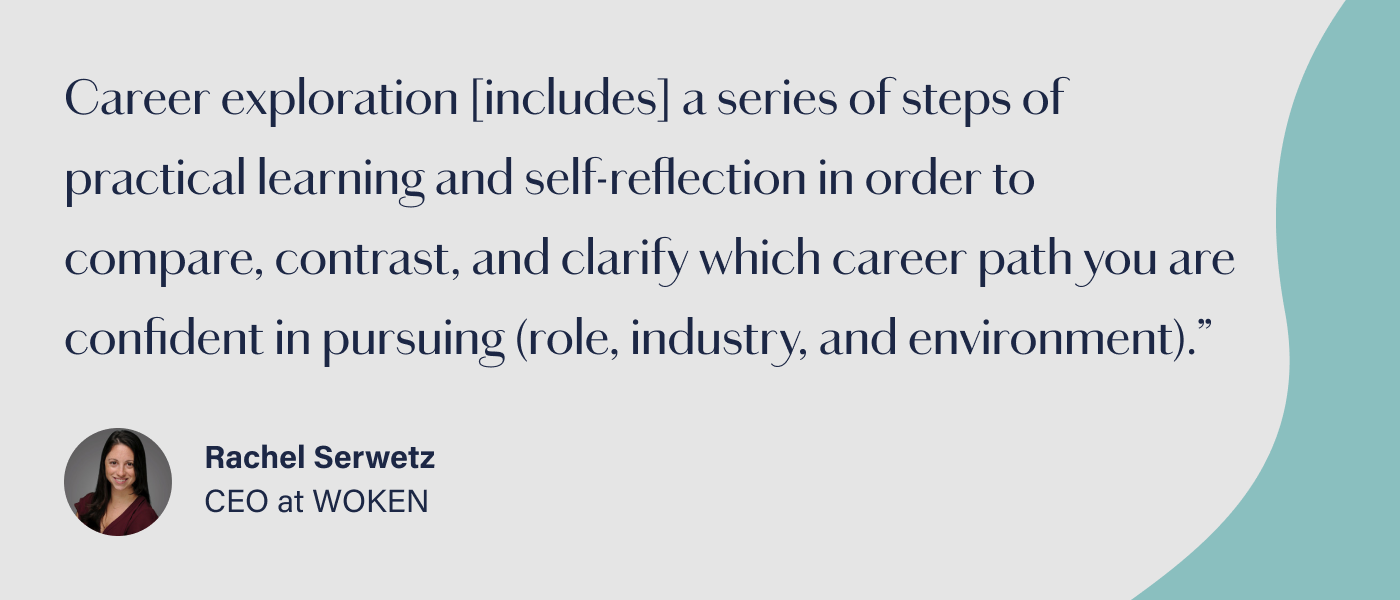
Rachel Serwetz , Career Exploration Coach & CEO at WOKEN suggests answering these questions first. Then, she says, “Listen to yourself -- if you feel unfulfilled by your role, industry, or environment, there is potential to find something that is a better fit. Consider pursuing career exploration. Career exploration is a process that is distinct from and a precursor to the job search, including a series of steps of practical learning and self-reflection in order to compare, contrast, and clarify which career path you are confident in pursuing (role, industry, and environment).” *You can take a career assessment to help with this at WOKEN .
You can also think about the pressures and expectations in your current role, and how you’re responding to them. Lindsay Gordon , Career Coach for Analytically Minded People, suggests this:
“The first thing I always have people do is to examine the pressures they feel about their job to understand if they have unreal or external expectations put on their work. One way you can do that is to fill in the phrases “The voices around me are saying: I should be a… I have to… My career has to…”
2. Are you noticing any of these key indicators that it’s time to move on?
Kathy Caprino is a Career & Leadership Coach and Author of The Most Powerful You:7 Bravery-Boosting Paths to Career Bliss . She suggests taking note of these key red flags that you should take action to address:
You’re unhappy most of every day doing this work. The clearest sign that you need a change is how you feel internally about the work you’re doing. Ask yourself if you feel unhappy, depressed, bored, misunderstood, or mistreated.
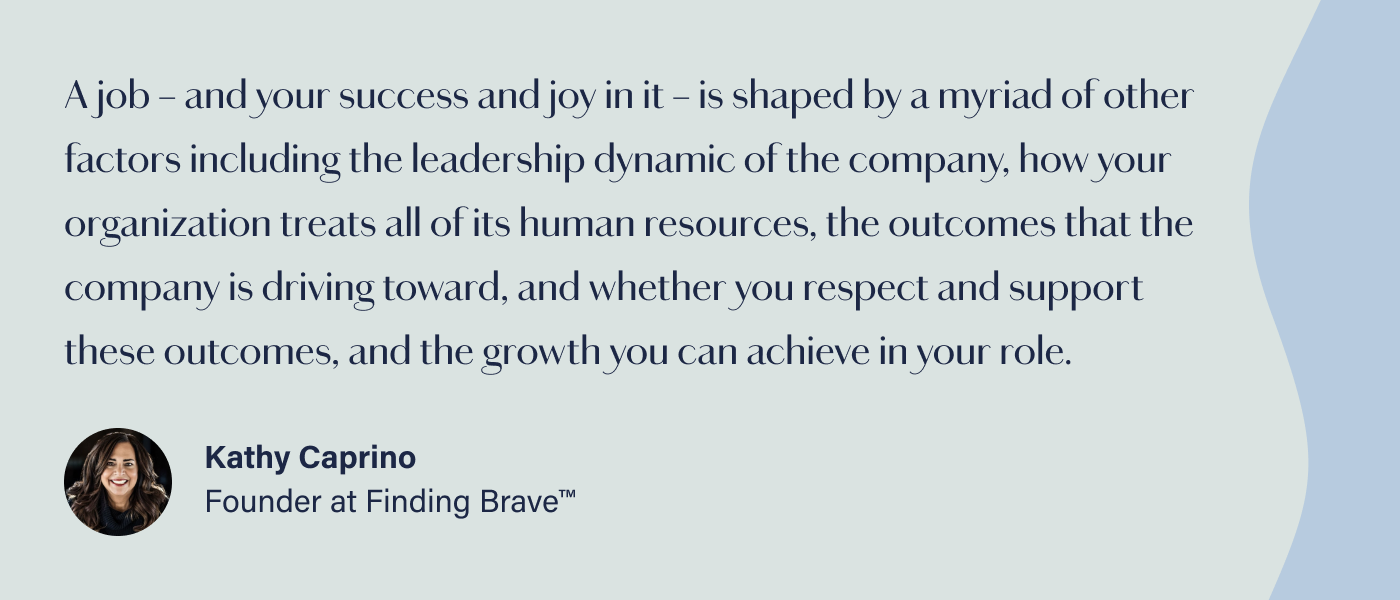
The environment is tainted with extreme toxicity and poor leadership and management, including your boss and colleagues. A job – and your success and joy in it – is shaped by many factors including the leadership dynamic of the company, how your organization treats its employees, the outcomes that the company is driving toward, and whether you respect and support these outcomes, and the growth you can achieve in your role.
The skills that you’ve been hired to use for this job aren’t a fit for what you’re good at or enjoy. Often, people don’t understand that the skills you possess are not at all the same as the natural talents and abilities that you enjoy using each day. In other words, you may be “great” at updating spreadsheets (or overseeing projects, or doing event planning) but you may actually hate doing it.
You believe deep down that you’re meant for better, bigger, and more thrilling things. Kathy has interviewed hundreds of successful career changers, and many of them shared with her some version of this: “I had this terrible, nagging feeling for years that I was made for better or different things than this, but I just didn’t act on that feeling until I finally snapped and say “Yes!” to myself.”
The outcomes that you’re working toward feel meaningless or negative to you. Finally, how do you feel about the outcomes that your job supports? Do you love what you’re working on, and do you feel it has contributive value in the world? You simply cannot thrive if you subconsciously oppose what your employer and your work stand for in the world.
3. Are you learning and growing?
One of the most important questions to ask yourself is whether you see growth opportunities in your current company or role. Yulia Eskin , Career Coach For Software Engineers, suggests asking yourself these questions:
Does your company have a promotion rubric for your role and do you have clarity on how it applies to you? What’s the rate and frequency of promotions?
Does your current manager facilitate your career advancement by strategically placing you in the right projects to help you grow in the right areas? If not, can you report to a different manager who can help boost your career?
If you’re at a smaller company that doesn’t have promotion schedules, do you feel supported and like you have a clear direction for growth?
Meaghan Wagner , Career Development Coach, suggests this growth mindset question:
"What skills do you want to learn… and be using in your current role? From there, you can consider whether your current role offers you these opportunities or not."
Career Coach Kelly Ling , agrees:
"Deciding whether to stay or go boils down to what new skills or experiences you are trying to gain in the stage of your career, and whether or not you can get this from your current company. If you are still learning and growing at your current company, that is a great reason to stay."
On the other hand, if you’re not seeing learning and growth in your current role, you could be hurting your career prospects down the road. Here’s what Beatriz Albini-Ruiz , Executive Leadership and Career Coach, cautions:
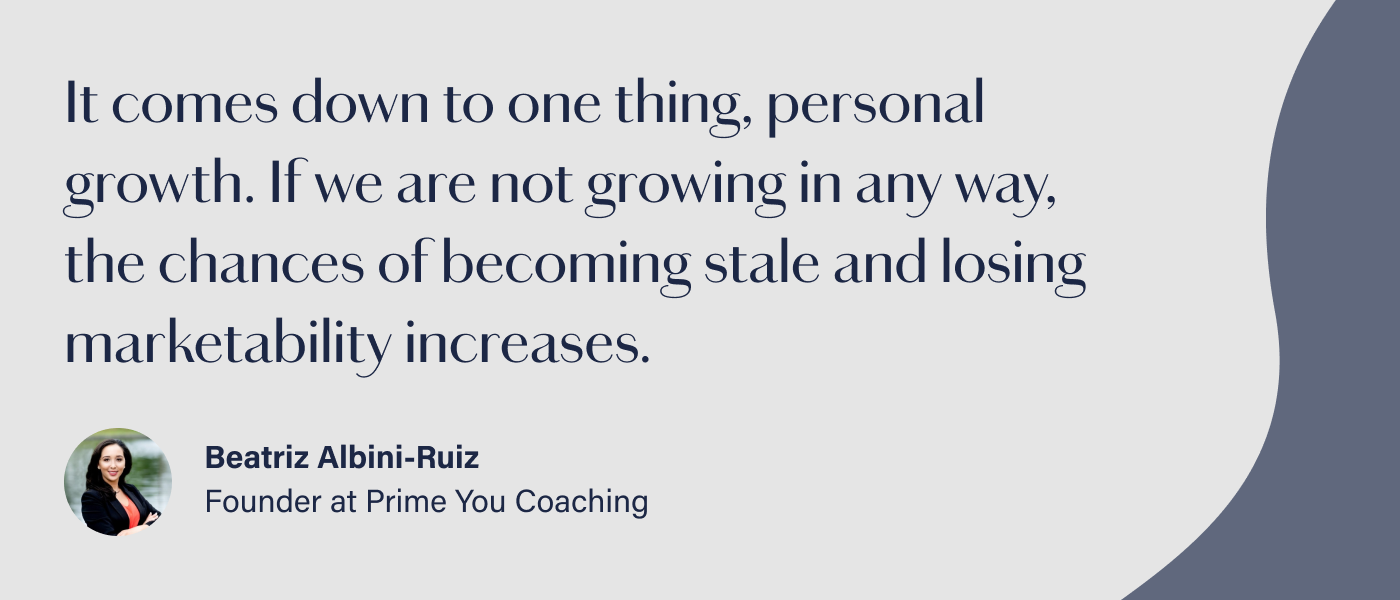
"It comes down to one thing, personal growth. It's very easy to continue getting a paycheck, justifying and tolerating things at work, because of the comfort of a steady income. However, if we are not growing in any way, the chances of becoming stale and losing marketability increase. This can lead to worse outcomes down the road. If you are in a job, going through the motions, on autopilot, and feeling de-energized and stagnant, it’s time to move on."
4. Can your current challenges be addressed by having a conversation with your manager?
Before you decide to start to look for something new, consider talking to your manager about the parts of your current job that you’re dissatisfied with. They may be able to help you develop your desired skills, or assist with a transition to another team where you can get the experience you’re looking for.
As Career Coach Marie Zimenoff put it:
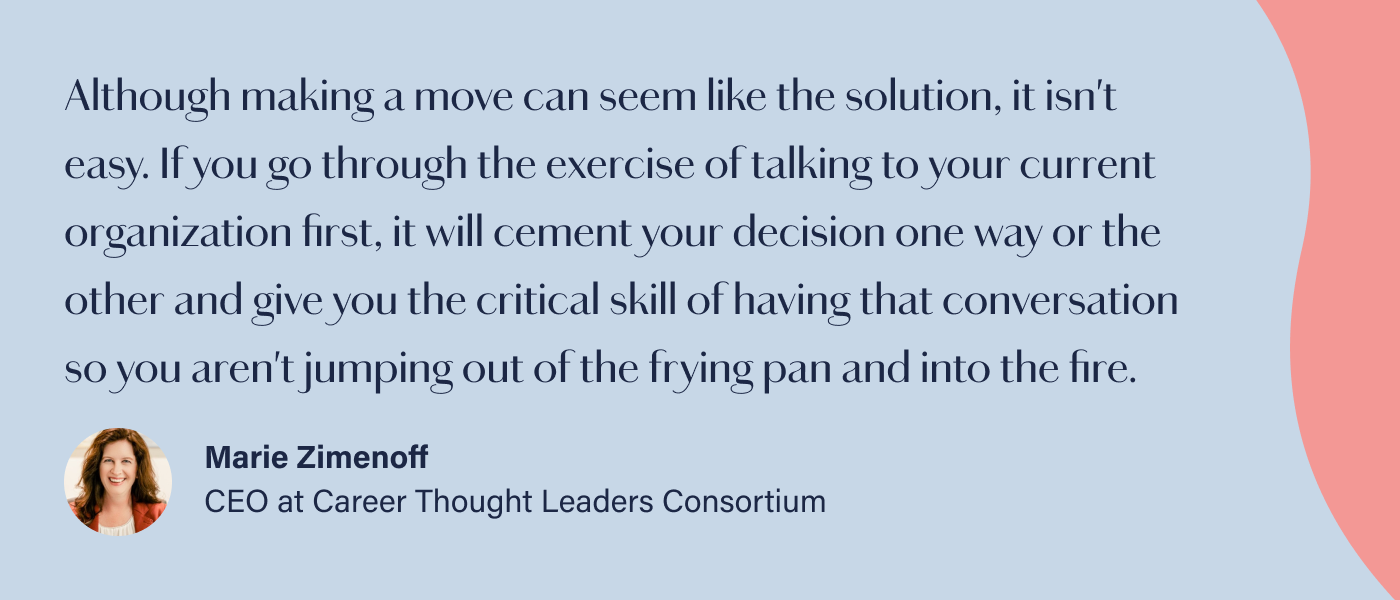
“Although making a move can seem like the solution, it isn't easy. If you go through the exercise of talking to your current organization first, it will cement your decision one way or the other and give you the critical skill of having that conversation so you aren't jumping out of the frying pan and into the fire.”
You also may have some leverage to negotiate your title, promotion schedule, or salary and benefits right now. Kelly Ling , Career Coach, agrees:
“While it's certainly "in vogue" to consider leaving a company right now, it may actually be an advantageous time to stay. Given many companies are seeing talent leave post-pandemic, it might be worth exploring asking for a raise or retention bonuses, increasing your role and scope, or asking to maintain more flexible working arrangements.”
The point is, you’ll never get what you don’t ask for!
Feeling curious? 4 Exercises to Help You Land Your Dream Job
1. Think through your strength and skills, and identify how they make you uniquely qualified for specific jobs.
Whenever you do start your job hunt, you’ll want to have already done some target research and personal branding exercises to focus your search. Meg Guiseppi , Personal Branding and Executive Job Search Strategist, suggests:
• Targeting… identify specific companies where you’ll be a mutually good fit.
• Research… determine what it is about you that makes you valuable to them.
• Branding… sync your hard skills with the personal attributes and qualities you have that all combine to make you a good hiring choice.
This work helps you clearly differentiate the unique value you offer when you network and interview for jobs.
2. Assess the values that matter to you
Being intentional about your career means keeping your values top-of-mind. Ekua Cant, Career Transitions Coach, suggests these career values to reflect on:
Intrinsic Values: The values that help you feel motivated and fulfilled. Think here about the tasks required of your job, what you do, how you do it, and who you are doing it with.
Extrinsic Values: The tangible rewards such as wealth, social status.
Lifestyle Values: The kind of lifestyle that you want your career to enable.
An easy exercise that Nic Frick recommends is to grab a list of values (try Brené Brown’s list of values in her book, “Dare to Lead”) and see which ones jump out at you.
Experiment with putting different values into practice in your life for a few weeks and figure out which ones are most important to you.
For example, if you believe one of your values is authenticity, ask yourself:
How can I behave more authentically this week?
In what parts of my life do I struggle with authenticity?
If the value resonates, keep it. If not, continue to experiment with others.
3. Look back at your career with the MLN exercise
Setting aside some time to assess which jobs you’ve enjoyed most and the specifics about each of those jobs that you enjoyed, will really help when you’re back out there job searching. Michelle Carrizosa , Career Coach for Women of Color, recommends this exercise:
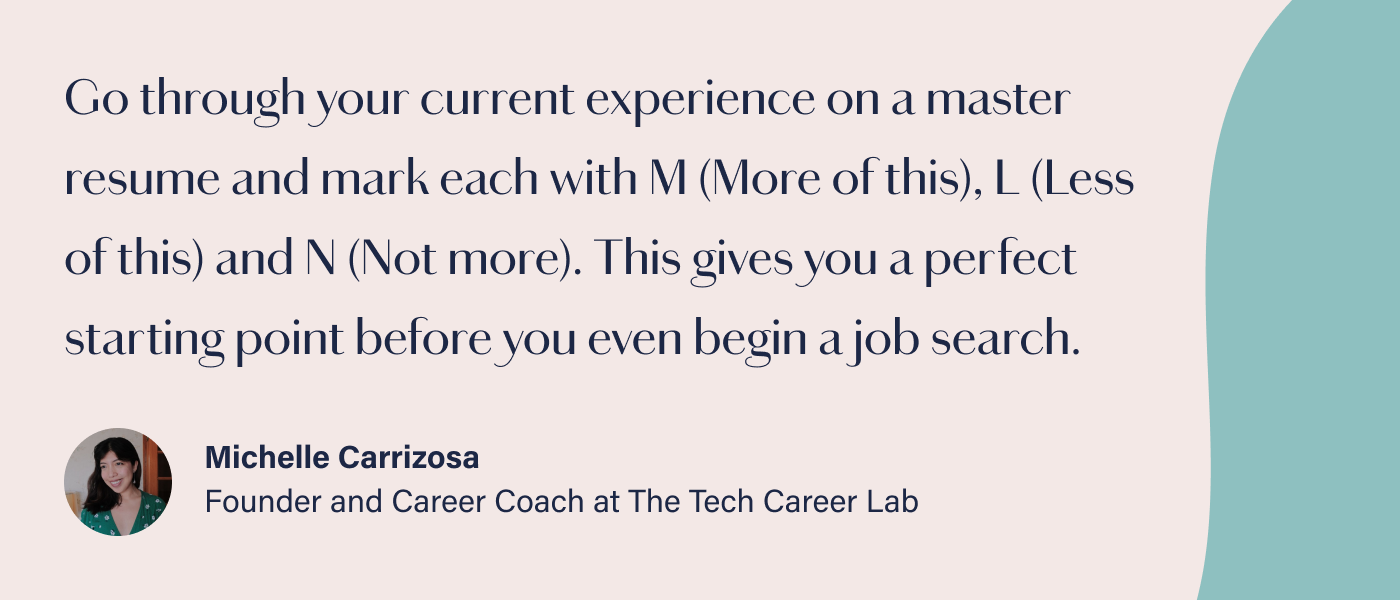
“One exercise I recommend is one I call MLN - go through your current experience on a master resume or most updated resume you have and mark each with M (More of this) if you want to continue doing that in your career, L (Less of this) if you don't enjoy a particular activity but you're good at it and N (Not more) - which is something you want nothing to do within your next role. This gives you a perfect starting point before you even begin a job search.”
4. Do some informational interviews to explore other paths
Once you’ve gone through all of the above exercises, and you have a sense of some roles that might interest you, Career Coach Ana Lokotkova suggests informational interviews to help you learn more.
"Use LinkedIn (editors note: or Elpha! ) to find at least 10-20 people who are a few steps ahead of you in the career you have or want and set up informational interviews with them.
The purpose of an informational interview is to get to know the other person and gather valuable insights from their experience. Prepare a list of targeted questions about their current and previous roles, work culture at their organization, and key lessons learned. Listen carefully for clues on items that matter to you the most.
After every informational interview, take note of your biggest findings and gather all your notes in one networking database. This exercise is great for anyone who enjoys hearing real-life examples instead of abstract theories, and wants to gain more clarity on their next steps." Remember, when you’re ready to start your job search, make sure it’s for the right reasons. As Career Coach Fanni Gabor says,
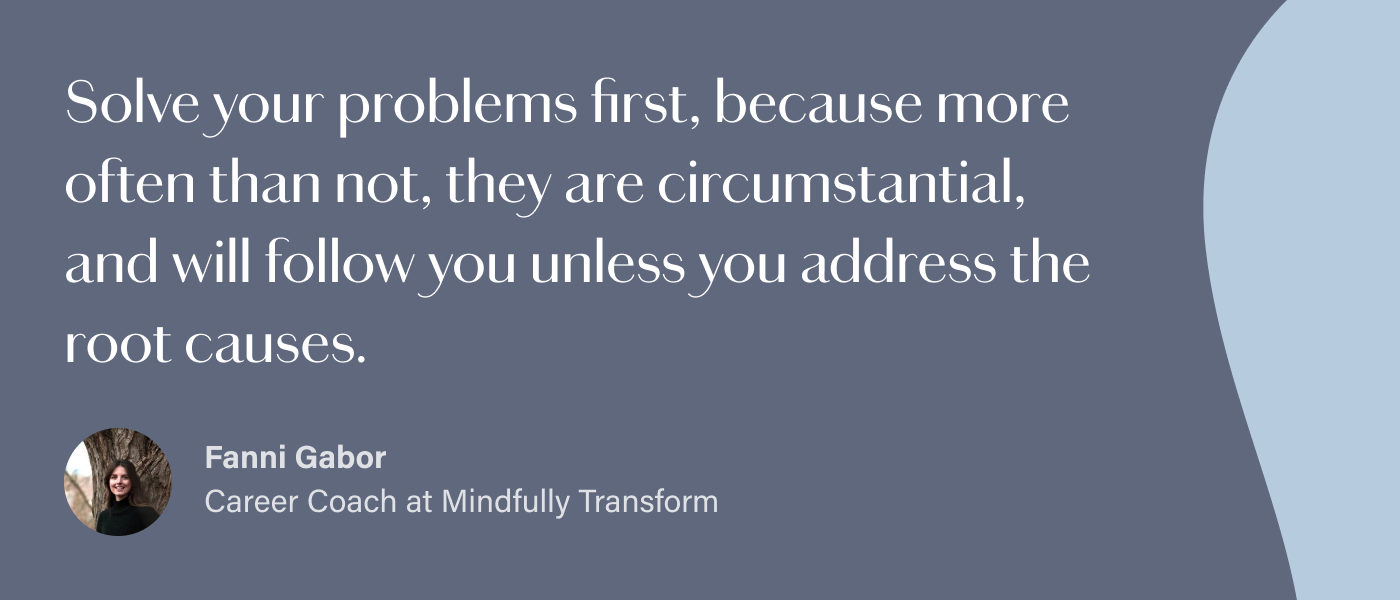
We hope this guide has helped provide a few useful frameworks for thinking about your best next career move. Thank you to all the Elphas who contributed!
Check out our next piece in this series: how to resign from your job . We asked Elphas to share their advice about quitting once the decision is made and have more than 50 stories from their experiences to share.






